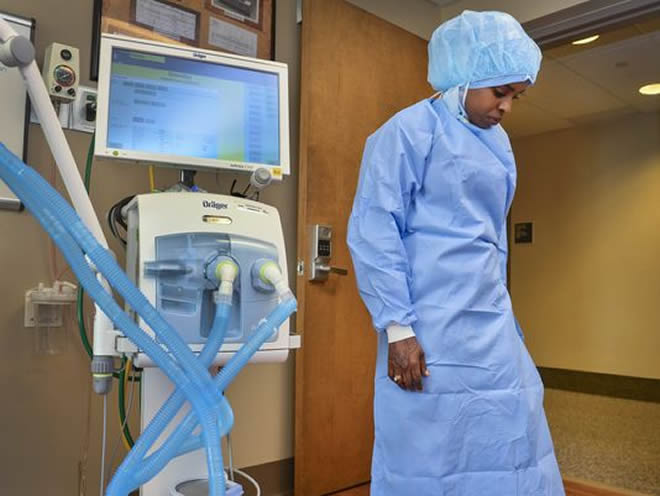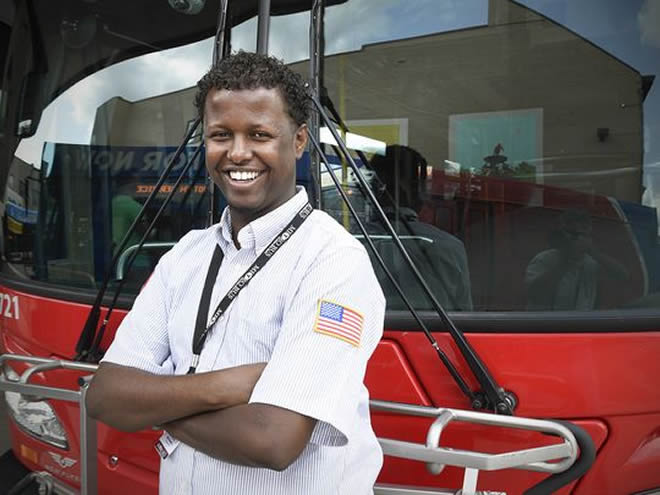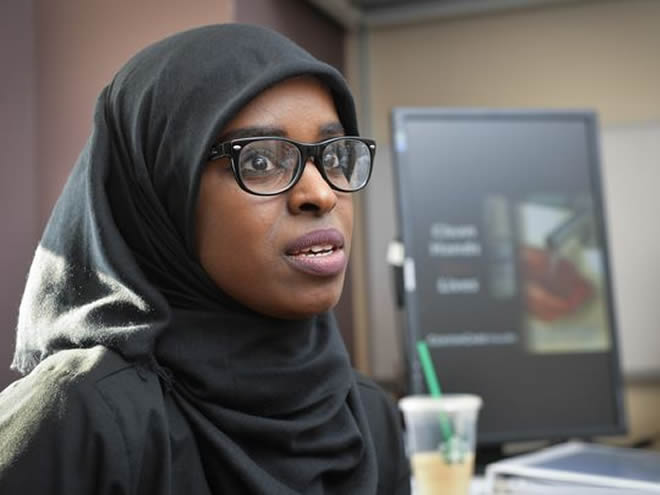
Saturday, August 06, 2016
By Kirsti Marohn

Respiratory Therapist Yusra Omar models the gown that she wears when she works in the operating room Wednesday, Aug. 3, 2016, at St. Cloud Hospital. The gown is a compromise that was worked out to satisfy both the patient safety requirements and her religious requirements as a Muslim woman. She would also wear a mask, gloves and booties. (Photo: Kimm Anderson, [email protected])
As part of her job helping patients breathe, Yusra Omar sometimes is required to go into sterile operating rooms where street clothes aren’t permitted.
The standard operating room attire for respiratory therapists is a surgical scrub top and pants. But following Muslim tradition, Omar wears long skirts and covers her head with a scarf or hijab.
Omar worked with Peggy Lange, director of respiratory care at St. Cloud Hospital, to find a solution. After looking at what other hospitals do and browsing medical clothing suppliers, they settled on a longer surgical gown worn over scrub pants with a head covering.
The uniform met the requirements of the hospital to protect patient safety, and allowed Omar to follow her religious customs. It also works for Somali employees in environmental services, who clean the operating rooms.
“Everyone’s happy,” Omar said.
The case highlights how some St. Cloud-area companies are overcoming employment obstacles rooted in cultural differences.
In a tight labor market , some companies see a benefit to making minor accommodations to attract and retain Somali workers.
“I think they see a potential of these new immigrants,” said Ahmed Abdi, a Somali native and staff reporter at the St. Cloud Times who also works as an interpreter. “They’re eager to work for them, but they do have this little problem that they need to change.”
On the flip side, some businesses seem to be wary of hiring Somalis, possibly out of perceptions that they will need to make significant accommodations or concern that having workers who dress, look and speak differently from the Central Minnesota norm will create conflict.

MetroBus driver Mohamed Hussein transfers passengers at the Transit Center Wednesday, Aug. 3, 2016, in St. Cloud. (Photo: Jason Wachter, [email protected])
Employers such as CentraCare Health say that while issues sometimes do come up, fears that Somali workers will demand special treatment are misplaced.
“It’s the perception of the community that 'this is going to be difficult, so I’m not going to do it,' ” Lange said.
Todd McSorley, environmental services coordinator at St. Cloud Hospital, said companies that choose not to hire Somalis are missing out on part of the population that could be working for them.
“I always say I want the best workers, and to get the best, you have to get from every corner of the community,” he said.
As the labor market changes, the workforce is growing more diverse, said King Banaian, St. Cloud State University economist. People who are retiring are far less likely to be foreign-born than new workers coming into the labor pool, he said.
"That mixture is changing, and that mixture is going to be increasingly more of a foreign-born basis," Banaian said.
Some companies say it’s important for their workforce to reflect the community they serve, which also is becoming increasingly more diverse.
St. Cloud Hospital is serving a growing number of Somali patients, so having Somali employees helps overcome language barriers and make patients feel more comfortable during a stressful time, said David Waage, CentraCare’s director of employment.
“When you’re in a hospital, you’re often in a vulnerable state,” Waage said. “To have some comfort around you and caregivers that you know and trust — I think it’s important from a patient perspective.”
St. Cloud MetroBus also has been trying to hire more diverse workers to better reflect the city's population and particularly bus riders, many of whom are Somali.
"I would like MetroBus to have a workforce that represents the community that we serve," said Ryan Daniel, executive director.
That's been especially important at MetroBus's mobility training center, where trainers like Safiya Hussein teach people how to use the bus system.
But even companies that don’t work directly with the general public say there’s a benefit to having a diverse group of employees.
“Any group or workforce can grow … static or complacent, potentially, if everyone you hire is the exact same,” said Paul Bravinder, plant manager at Branding Iron Holdings, a meat-packing plant in Sauk Rapids formerly known as Huisken Meat Co. “Having people from different backgrounds can help us grow the company.”
Companies that hire Somali workers say they’ve benefited as employees spread the word about job openings.
“They would go back and tell other friends or family that we were hiring,” Bravinder said. “So that word of mouth seemed to help us.”
When the first Somali refugees arrived in St. Cloud, most had little education and limited English skills. They took low-skill jobs at poultry processing plants or other manufacturers where little English was required.
That's changing. As the Somali population becomes more established, more like Omar are attaining an education and pursuing skilled careers in health care, management and other fields.
"What's encouraging is that we're seeing more second-generation that are bicultural and bilingual and educated," said Lorraine Griffin Johnson, director of workplace and patient diversity for CentraCare. "Many are college graduates and starting to apply."
Omar has worked for the hospital for four years and recently completed her four-year college degree. She says she has no plans to leave, and would like to do more education and someday move up into management.

Respiratory Therapist Yusra Omar talks Wednesday, Aug. 3, 2016, about her attire. She usually wears the hijab with a version of scrubs when she's working on the floors at St. Cloud Hospital. (Photo: Kimm Anderson, [email protected])
She was inspired to pursue a career in respiratory therapy by her older brother, who suffered from asthma, and two family members who died from the disease. Soft-spoken with dark-rimmed glasses and henna tattoos covering her hands that show when she’s not wearing gloves, Omar helps put Somali patients at ease during some of their worst moments.
She’s good-natured about the questions she gets from some non-Somali patients, about why she covers her head or how she ended up in Minnesota. Omar sees it as an opportunity to educate people who have never had the opportunity to meet a Somali or a Muslim person.
In short, she’s the kind of employee Lange and CentraCare would like to keep.
"The professionals that I have worked with always have put patients first," Lange said. "Partnering with them to understand needs and wants is no different than any other employee."
But the story of Somali employment in St. Cloud hasn’t always been rosy.
In 2003, St. Cloud freezer manufacturer Electrolux settled a complaint filed by the Somali Community Center in Minneapolis that said it failed to accommodate prayer times for its Muslim employees.
Five years later, Gold'n Plump Poultry, now known as GNP, was the target of a class-action lawsuit filed on behalf of Somali workers at its Cold Spring plant, also over prayer time.
Steve Philion, co-chair of the Greater Minnesota Worker Center, said many of the issues arise when there isn’t good communication between the workers and management.
“Usually the problem is because there’s a lack of willingness of the part of management to dialogue with workers to find a way to resolve the situation,” Philion said.
There’s a stereotype about Somali employees that they just want extra breaks or paid time for prayers without making any sacrifices, Philion said.
But he said Somali workers tend to be very willing to make compromises, including working extra hours or covering for each so the work line operation isn’t hindered.
Companies say some of the perceived differences that might cause an employer to shy away from hiring Somalis — language, clothing and time off for prayer or Muslim holidays — can be resolved through good communication.
Some companies such as GNP, have created programs to teach employees English. Others, such as CentraCare, offer bilingual employees incentive pay.
Branding Iron Holdings trains employees using videos and photo-heavy PowerPoint presentations to help employees who don’t have strong English skills, Bravinder said. The training is in English, but the company is considering adding training in Somali next year, he said.
Promoting Somali-speaking employees to supervisory positions also can help improve communication, help new employees understand expectations and resolve any potential problems, employers say.
While most devout Muslims pray five times a day, working prayer time into the work day usually doesn't create a problem. In fact, some employers say it rarely comes up.
Somali workers at CentraCare fit their prayers into their regular 15-minute breaks, Griffin Johnson said. There's a meditation room at the hospital that can be used by people of any faith.
Abdi said Somali workers don't expect to be paid for their prayer time, but do want the ability to take a break.
"I think because of the time that you are spending at your workplace, people don't want to forget their prayers," he said.
Fears that Muslim employees will want a lot of time off around Ramadan also tend to be unfounded. In fact, a diverse workforce can be a boon when a large number of employees want time off around Christmas or other Christian holidays, or simply to partake in their own cultural traditions.
Abdi recalls talking to leaders of a bakery company that had struggled to find employees who were willing to work on Sundays during pro football season. But Somali workers didn't mind, he said.
Not every issue has an easy resolution. The Muslim faith prohibits eating or in some cases touching pork or alcohol, for instance. Bravinder said Branding Iron, which sometimes processes pork, is up front with job applicants. While the company wouldn't let someone go because they would not work with pork, the expectation is that every employee can work in every area of the plant, he said.
Bravinder said it's important to have clear expectations and open dialogue.
"Do we have to bend over backwards and change our entire system? If we had to do that and it was detrimental to the company, we would not be able to accommodate 100 percent," he said. However, the company will talk with individual employees and work with them to suit their needs, Bravinder said.
CentraCare's McSorley said it's critical to make sure staff feel comfortable coming to managers if there is an issue.
"It's just getting over that perception that there's going to be conflict," he said. "You're managing people. There's going to be conflict. You just have to be comfortable and ... open to it."